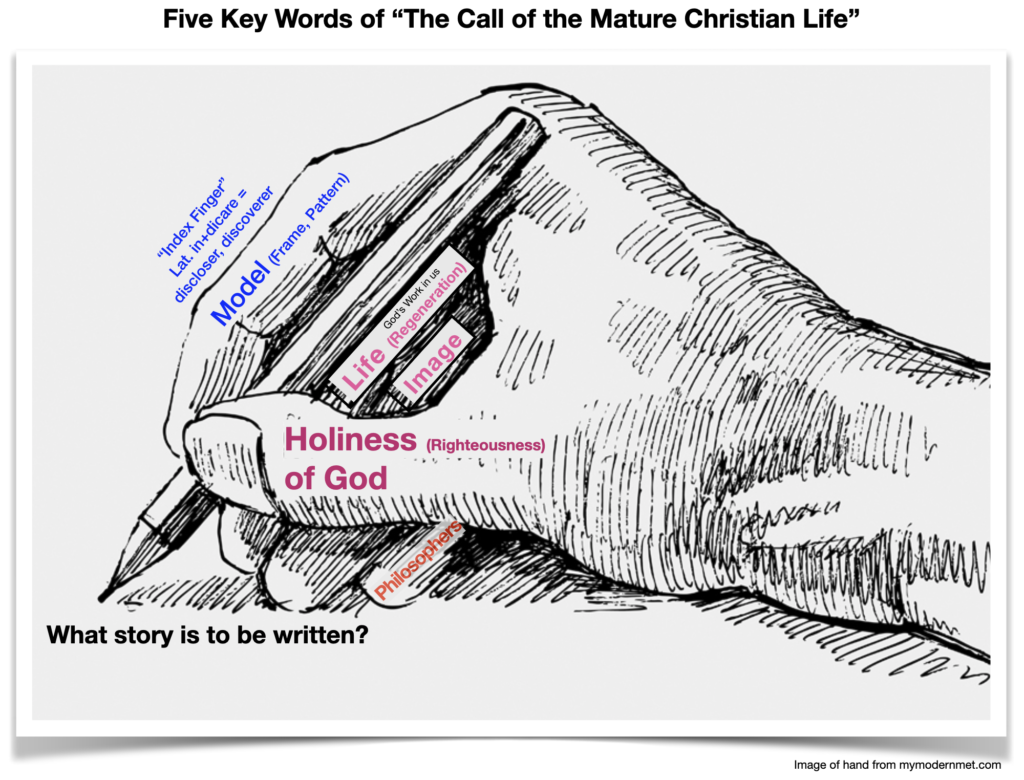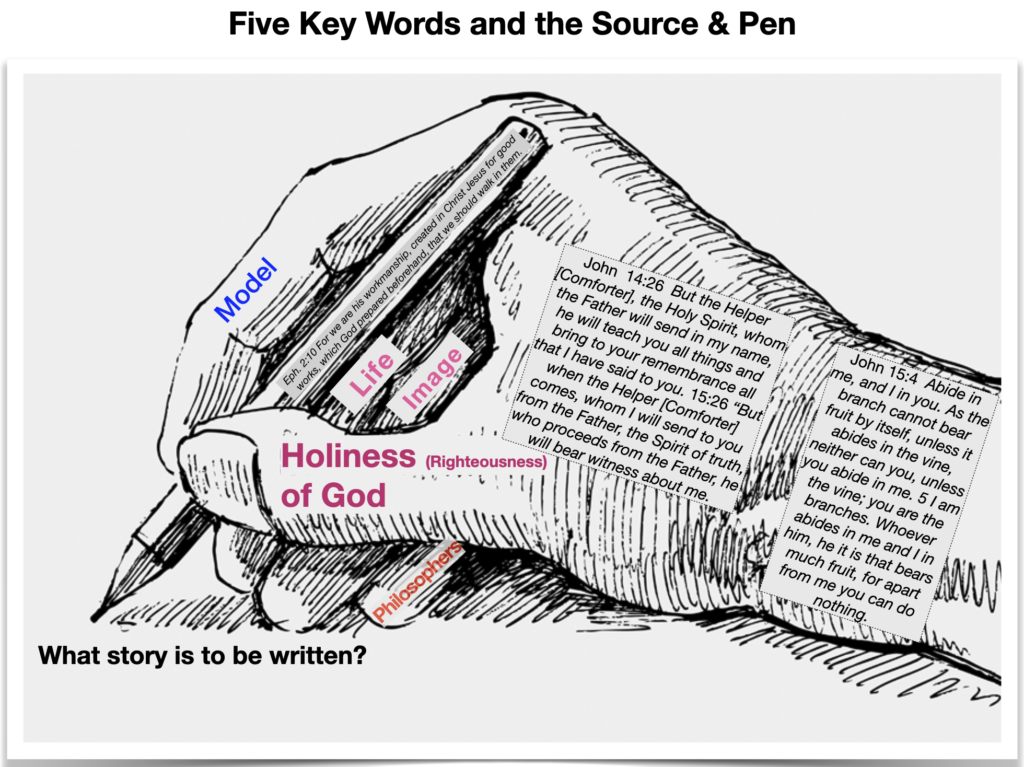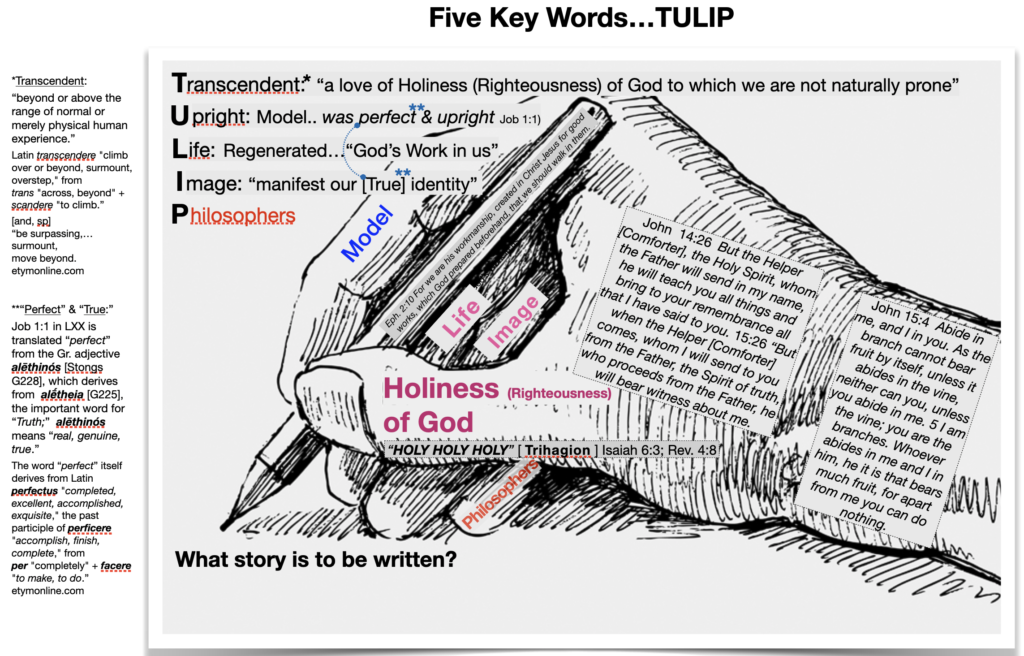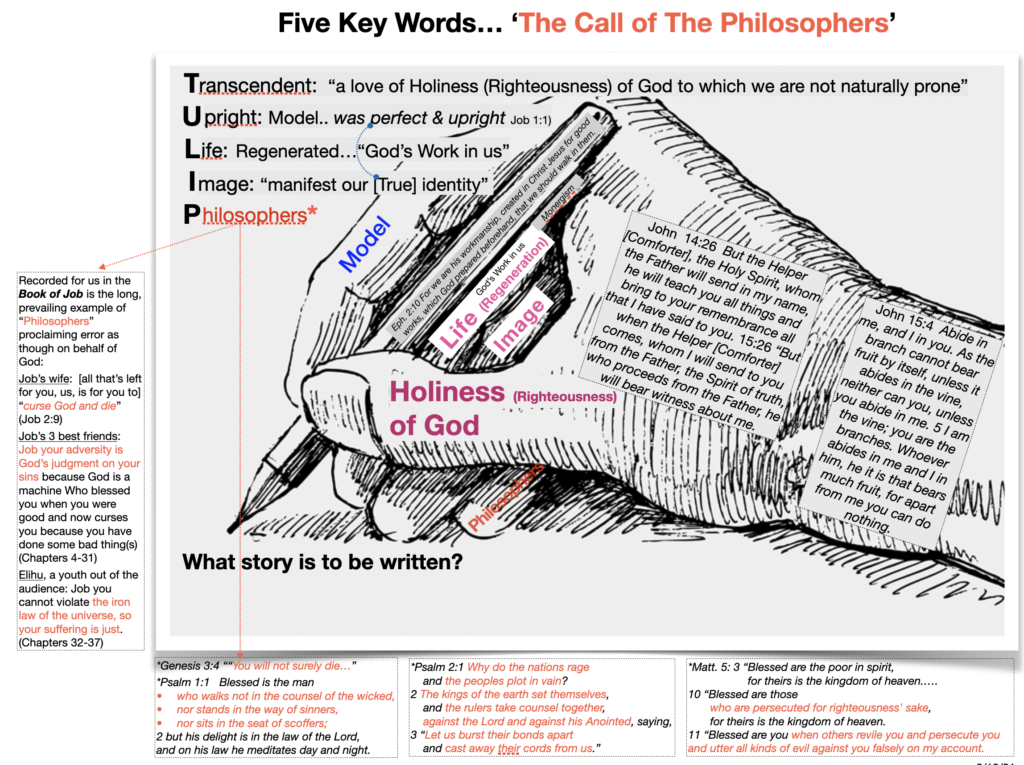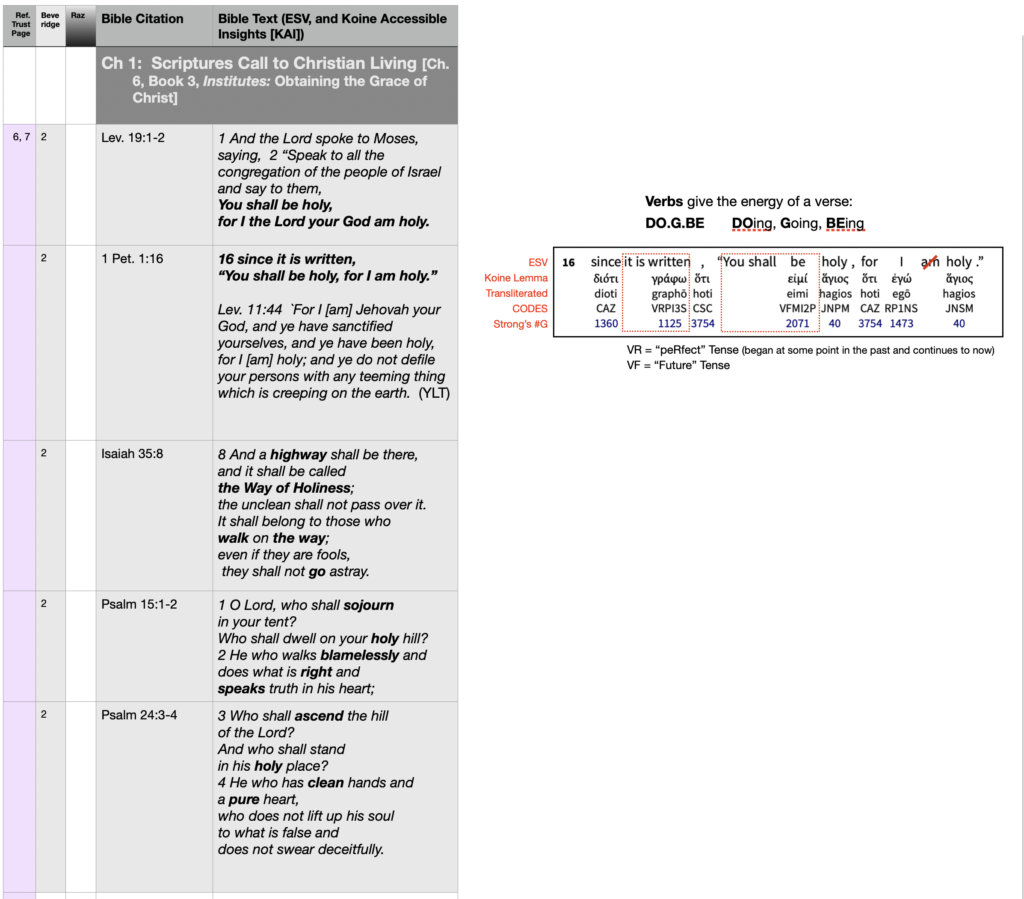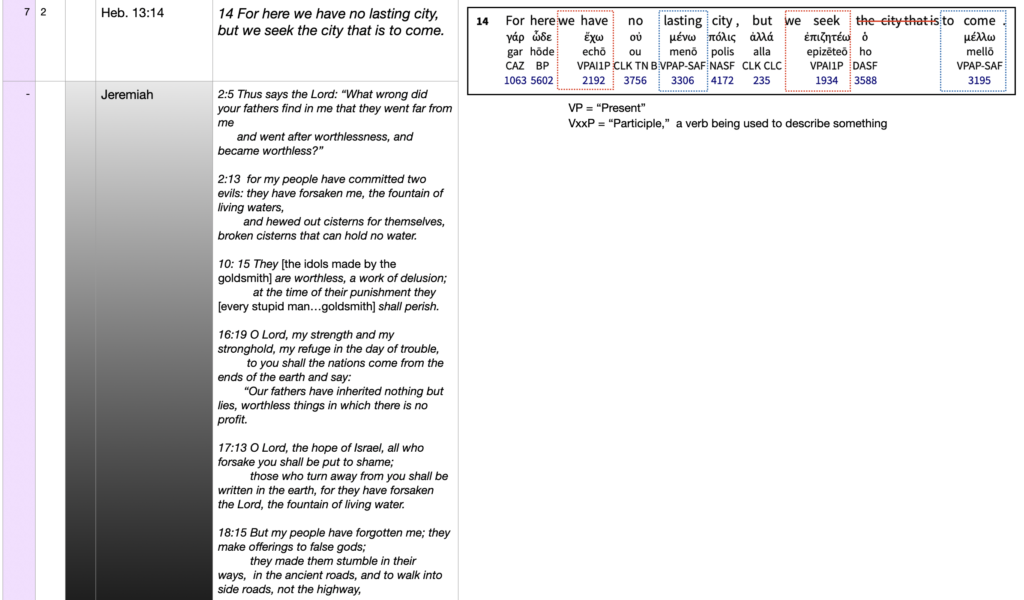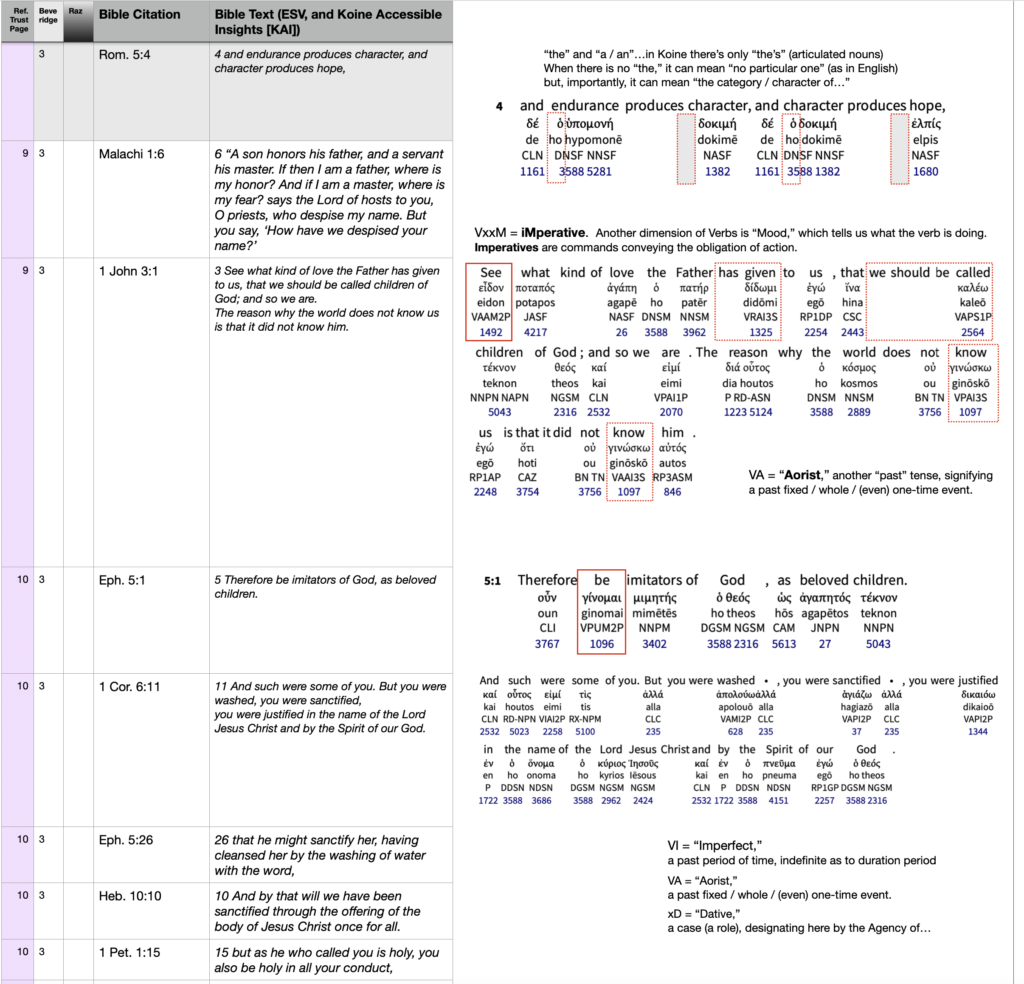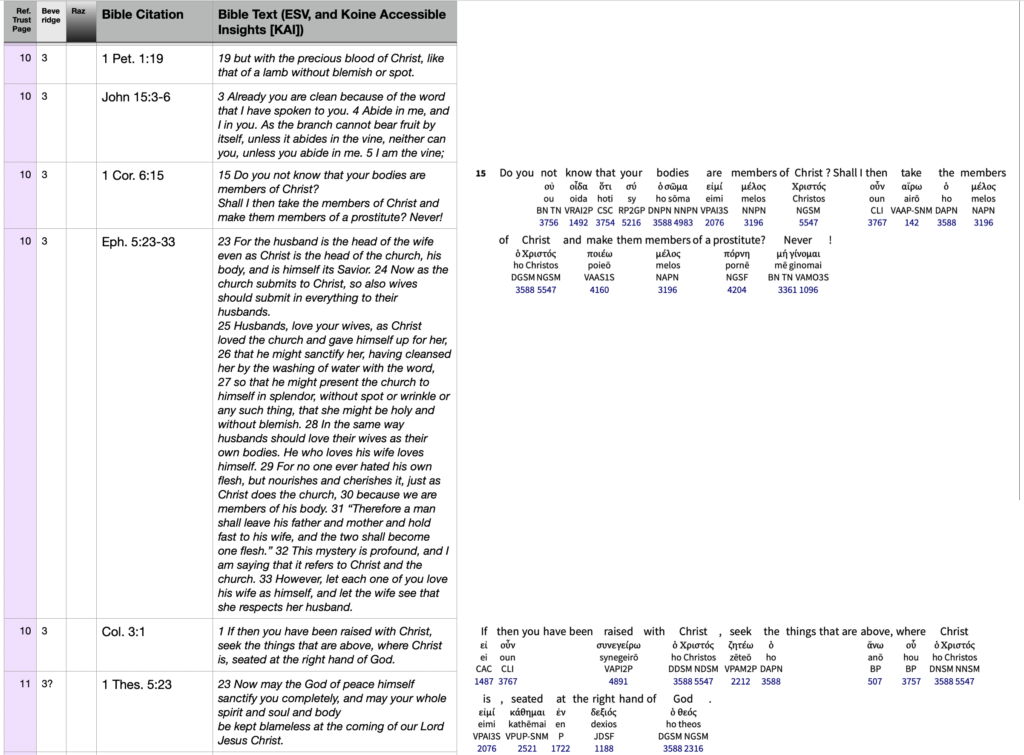This week’s study is on Calvin Ch. 3, Sec.s 1-2, pp. 57-62 in the D&P translation. In the Beveridge translation of Calvin’s complete Institutes, the corresponding sections are in Book 3, Chapter 8, Sec.s 1-2.
Beverage translates Calvin’s summary of Ch. 3 as below:
Of Bearing the Cross—One Branch of Self-denial
The four divisions of this chapter are,—
Calvin, J., & Beveridge, H. (1845). Institutes of the Christian religion (Vol. 2, p. 273). Edinburgh: The Calvin Translation Society.
I. The nature of the cross, its necessity and dignity, sec. 1, 2.
II. The manifold advantages of the cross described, sec. 3–6.
III. The form of the cross the most excellent of all, and yet it by no means removes all sense of pain, sec. 7, 8.
IV. A description of warfare under the cross, and of true patience, (not that of philosophers,) after the example of Christ, sec. 9–11.
Specific to Sec.s 1-2 of Ch. 3, Beveridge translates Calvin’s headings as follows:
1. What the cross is. By whom, and on whom, and for what cause imposed.
Its necessity and dignity.2. The cross necessary.
Calvin, J., & Beveridge, H. (1845). Institutes of the Christian religion (Vol. 2, p. 273). Edinburgh: The Calvin Translation Society.
1. To humble our pride.
2. To make us apply to God for aid. Example of David.
3. To give us experience of God’s presence.
Verses Cited in Ch. 3, Sec.s 1-2, D&P
The verses cited by Calvin (or possibly by D&P in their translation) in these first two Sections of Ch. 3 are given below:
The Significance of The Cross in Self-Denial
As the subject of self-denial was covered by Calvin in Ch. 2, why is this separate treatment of the subject necessary? Or, put in another way, what is distinctive of “the cross” in the context of this subject?
As noted in the verses of above, specifically Matt. 16:24, the Lord Himself gives that command to his disciples. To better understand the context of vs. 24, below is the text in Matt before and after this verse:
Note that Matt. 16 begins with the Lord refusing to perform sign-making for the Pharisees and Sadducees. And He gives a telling reason: that they, His inquisitors, are the leaders of an “evil and adulterous generation” (Matt. 16:4). Such a statement was the ultimate rebuke of leaders who saw themselves as God-favored. Jesus reversed the inquisition: they thought it was Jesus who was on trial, and expected to be found guilty of treason against Moses, whereas it was they who were guilty, of both failure to keep the very law they claimed to uphold, and of cosmic treason against God. Note the significance of the dramatic closing sentence, “So He left them and departed.”
Then, in the next three paragraphs we see (1) Jesus warn His disciples regarding the hidden effect of the teaching of the Pharisees and Sadducees, (2) Jesus evoking the great realization as to His true Being and purpose, and (3) Jesus foretelling that such hidden teaching (the leaven) would result in His being judged, condemned, and killed, before rising from the dead. The disciples comprehended none of this. Further, Peter, after having made the great confession (Matt. 16:16), now speaks the words of Satan (Matt. 16:21), a manifestation of that “leaven.”
Now, the next paragraph, gives us the Lord’s command to “deny himself…take up his cross…follow Me” (Matt. 16:24). Clearly from this context, such “cross” is not in regard to some sickness, ailment, sin habit, physical or economic limitation, depression, or any other such thing. Jesus is foretelling that the forces of the Pharisees and Sadducees–The Religion Industry (TRI) of its day–will seek Jesus’s death and that of the disciples, in alignment with the Roman authorities–The Political Industry (TPI) of the time–using the tool of utter condemnation, shame, and terrorizing example, namely that of crucifixion on a wooden cross.
The Cross is a Tool of the Christian Life
Let us now consider several charts to examine how the cross is a tool that is used by God for our good and His glory.
Big Picture
First, let’s frame a big picture of the broad sweep of the Bible’s story, as below in Chart 1:
The word translated “Garden” in Genesis means a walled in, designated area. From the context it clearly suggests that such area was filled with sources of food, and the forbidden tree with its fruit. That Garden was home for Adam and Eve, a kind of shelter, a place to which they belonged.
They also belonged to God with Whom they had regular direct communion. Then there was the deception of Eve and willful rebellion of Adam resulting in God’s judgment. That judgment included the forewarning of “dying you will die” and permanent expulsion from the Garden.
The result was, and has been, an extended time period of decay and death, separated from the intimate face-to-face connection to God. In broad strokes this period is referred to as “the world” translating (in the NT) the primary word “kosmos,” meaning order, structure, even beauty, and sometimes translating another Koine word, “aeon” meaning an age, or period of time.
In the Epistle of 1 John 5:19, as shown in the above Chart 1, that although we are of God, that is we are God’s own possession by virtue of His having purchased us in redemption, but at the same time the world, the kosmos, lies in the Evil One. This last phrase, “in the Evil One,” is a Koine dative phrase, that could mean “in” in the sense of spatial location or time. However, I believe that here it means “in” in the sense of agency or instrumentality.
We see such instrumentality of “evil” or “the evil one” immediately after the Garden expulsion. The very next scene in that story takes place many decades later when the two oldest brothers, Cain and Abel, participate in a worship event toward God. For reasons outside our scope here, God accepts the sacrifice, and by implication the one making it, of Abel, but rejects that of Cain. Such acceptance of Abel leads to Cain’s violent rage and his murder of his own brother. And that leads to Cain’s own expulsion from the family of Adam, to become a lifelong homeless, shelterless, wanderer. So, in one scene, Adam and Eve lose their two sons.
At the other end of the space-time kosmos, which is yet to come, is God’s final judgment which includes the revelation of beasts, false prophets, and most-notably the Great Whore of Babylon, as from the Book of Revelation. For our purposes here we note only (1) each and every person dies, suffering Adam’s (and Eve’s) judgment, as our representative head, and (2) the kosmos itself will likewise be judged and destroyed. Chart 1 above is constructed to emphasize the inevitable fall to death and judgment, sucked in, as it were, by the Evil One and his agents.
This is, and should be, a horrifying reality, one of no human escape.
God’s Provision of Shelter
Next, let us consider how God provides shelter for His Elect external to Eden, even as they are immersed in the fallen kosmos, as shown in Chart 2 below:
After the Fall and God’s pronounced judgment of death, but prior to the Expulsion out of Eden, God does a deeply significant act: He provides a shelter for Adam and Eve. They had, apparently, been coated with light during the period of their submission to God but were now naked, ashamed, and unprotected from the elements facing them outside the Garden. God shed blood to take that which Adam and Eve were not entitled to at the cost of the life of the giver of the sheltering coat. This covering anticipates the multi-colored, favored robe of Joseph, son of Jacob, and of the seamless robe of Christ, gambled for by his crucifiers.
As shown in Chart 2 above, there is a continuous thread of shelters which God has provided for His people who are strangers and aliens here in the kosmos. Such shelters take many forms, but they have this in common: they are a provisional shelter, like that cleft in the rock, or the strong tower, or walled city references throughout the OT. They together prefigure our permanent shelter, including that of a new, glorified body, and becoming an inhabitant / citizen of the Heavenly Jerusalem.
The Kosmos Provides a False, Deceitful Shelter
Next, let us think about how The Religion Industry (TRI) of the Kosmos–sometimes with or by The Political Industry (TPI) of its time–provides an alternate “shelter” as part of its labyrinth of confusion and evil. See Chart 3 below, where below the shelters of God are reference to these deceitful shelters of the kosmos.
Calvin makes frequent, important reference to “philosophers.” Such term does not transfer well to our time. Calvin lived in the second century of what historians call the period of the Renaissance. Relevant to our topic, this period was known by the admonition “ad fontes,” to the sources (fountain), meaning rediscovery and application of the ancient Greek and Latin writers and philosophies such as Stoicism, Platonism, Aristotelian ideals, etc.. Such philosophers stood against the other major force of the period the Roman Catholic Church then powerfully allied with many political powers on the Continent of Europe.
In our own time both The Religion Industry (TRI) and The Political Industry (TPI), subjects outside our current scope, offer many forms of different ‘shelters’ to which they entice and even command obeisance. Chart 2 shows five such categories.
An interesting example of such false shelters is given by the journey narrative of Pilgrim’s Progress by John Bunyan. The pilgrim is a man named Christian. He begins his journey responding to a call by a man named Evangelist telling him to flee his home city (shelter) named Destruction, to reach the Celestial City, his final shelter. The entire book details all the many difficulties (such as “the slough of despond,” i.e. the bog of despondency) and many false ‘shelters’ (such as “vanity fair”) to which he is exposed and tested. It is another “great book” that has been very widely republished since it’s original publication in ca. 1680.
Taking Up the Cross, Gets Us to Shelter
Finally, let us now examine Calvin’s call to action as to our self-denial by taking up our cross. See Chart 4 below:
Is “taking up the cross” a necessary ‘bad’ thing in this life, or is it a pathway to our shelter? A common interpretation of the phrase is the former. I believe it is the latter.
As discussed in a separate webpage of The Cross on this site, the cross helps us escape the labyrinth of the world’s system (the kosmos) to the present shelter of God’s provision. We’re much like the Pilgrim Christian in Pilgrim’s Progress who has to constantly avoid being waylaid on his journey to the Celestial City. So we too are lured by the various ‘shelters’ offered by the kosmos, including approval, and a place ‘at the table’ of the great conversations of the culture.
Love and The World
In the below pdf are all the NT verses that have both “love” and “world” (in the ESV):
This is an imperfect search, nonetheless three ‘hits’ are relevant to a particular question regarding “taking up the Cross,” namely this: why does God use such extreme language (the cross itself) and commonly severe measures for His own? Part of the answer is in Calvin’s Sec. 1 and 2, and more completely in next week’s Sec. 3. Another part, in my opinion, has to do with our seeking the proper, God-provided shelter as discussed here. A third point can be made that the world, contrary to our beliefs and its appearances, is our enemy. Consider the particular verses given above: John 15:19, 2 Tim 4:10, 1 John 2:15.
John 15:19 takes place in the Upper Room literally hours before Christ is condemned by both TRI and TPI, and executed by the most vicious tool of hatred and reviling, the cross. This verse says it plainly: (1) we are not of the world, (2) we were chosen out of the world, and (3), as a consequence the world actually hates us.
2 Tim 4:10 gives us a brief CV on an otherwise obscure man named Demas. (His name is closely related to “demes” which was a politically organized unit, something like a county or small state in terms of the U.S., which may give us a clue as to his interests). Here we see two coupled ideas: love of the world and desertion. This is particularly significant because Demas occurs in two other of Paul’s Epistles showing him participating in gospel work (Philemon, and Col. 4:14). So deserted (Gr. egkataleípō, G1459) is a proper, and very somber term, and should be a warning to each of us as we traverse life’s journey in and among the world and its lures.
1 John 2:15 tells us two things. First is the present active imperative command to “not love” with respect to its direct object “the world” (kosmos). The word “love” is agapáō (G25), the same word used of Demas’s ultimate desire (2 Tim 4:10). Secondly, the verse gives us the why behind the command: loving the world means not having the love of God our Father in us.
If taking up the cross does nothing else but protect us from becoming world-lovers it is clearly a great good. This is particularly so as Calvin extensively notes our natural inclination from birth to death is to love this world in a way incompatible with the love of God. Later in Ch 4 and 5, Calvin will discuss the obvious objection concerning the good that does exist in our environment, and our responsibilities living in and amongst it.
Noting again the journey of Christian in Pilgrim’s Progress, we see the many occasions whereby he was lured aside away from the path to the Celestial City. Of particular relevance is the scene known as Vanity Fair.
The Pursuit of Virtue
The subject of “virtue”–often termed “the good”–is as old as time, and has been addressed by the wisest of men, including, famously, Socrates some 2400 years ago. The further idea of “pursuit”–often termed “the quest” or “seeking”–is likewise a long and extensively considered dimension of the question of virtue.
A classic and deeply thought-providing secular story was written by Cervantes about the time of publication of the KJV, entitled The Ingenious Gentleman Don Quixote of La Mancha, or Don Quixote. The name “Quixote” is a play on the Latin word for searching as in “who, what…?” and from which we get words such as quarry, quest, question.
The mystery of that book is who, really, is that man after which the book is named? He appears to be an easily-dismissed loon, with a rational partner (Sancho Panza), a classic ‘buddy story’ put in multiple ‘fish out of water’ tropes. But as the narrative unfolds it can appear that Quixote is the rational one, who alone is truly seeking a true good, so that the apparent craziness of his being and activities seem such because virtue and its pursuit is so foreign to us as to appear irrational. But is what Quixote pursuing truly “good?” Or, maybe, he is only a true loon and wouldn’t recognize “good” even if he had a map to find it. These matters have been puzzled over for 400 years, making Cervantes’s book the classic that it remains.
A Monastic, Classical View on Virtue and Seeking
Thomas Merton (1915 – 1968) was a Catholic priest and trappist monk. He thought deeply of certain aspects of virtue (likely less so on the core truth of Biblical Doctrine). Below is an extended excerpt from a particular insight on how one is, or can be, moved toward virtue when it is so entirely foreign to our basic nature, and continues to be throughout our natural life.
The phrase self-conquest can come to sound odious because very often it can mean not the conquest of ourselves but a conquest by ourselves. A victory we have won by our own power. Over what? Precisely over what is other than ourself.
Real self-conquest is the conquest of ourselves not by ourselves but by the Holy Spirit. Self-conquest is really self-surrender.
Yet before we can surrender ourselves we must become ourselves. For no one can give up what he does not possess.
More precisely—we have to have enough mastery of ourselves to renounce our own will into the hands of Christ—so that he may conquer what we cannot reach by our own efforts.
In order to gain possession of ourselves, we have to have some confidence, some hope of victory. And in order to keep that hope alive we must usually have some taste of victory. We must know what victory is and like it better than defeat.
There is no hope for the man who struggles to obtain a virtue in the abstract—a quality of which he has no experience. He will never efficaciously prefer the virtue to the opposite vice, no matter how much he may seem to despise the latter.
Everybody [really??? EVERYbody??? See Rom 7 passage below] has an instinctive desire to do good things and avoid evil. But that desire is sterile as long as we have no experience of what it means to be good.
(The desire for virtue is frustrated in many men of good will by the distaste they instinctively feel for the false virtues of those who are supposed to be holy. Sinners have a very keen eye for false virtues and a very exacting idea of what virtue should be in a good man. If in the men who are supposed to be good they only see a “virtue” which is effectively less vital and less interesting than their own vices they will conclude that virtue has no meaning, and will cling to what they have although they hate it.)
But what if we have no virtue? How can we then experience it? The grace of God, through Christ Our Lord, produces in us a desire for virtue which is an anticipated experience of that virtue. He makes us capable of ‘liking” virtue before we fully possess it.
Grace, which is charity, contains in itself all virtues in a hidden and potential manner, like the leaves and the branches of the oak hidden in the meat of an acorn. To be an acorn is to have a taste for being an oak tree. Habitual grace brings with it all the Christian virtues in their seed.
Actual graces move us to actualize these hidden powers and to realize what they mean—Christ acting in us.
The pleasure of a good act is something to be remembered—not in order to feed our complacency but in order to remind us that virtuous actions are not only possible and valuable, but that they can become easier and more delightful and more fruitful than the acts of vice that oppose and frustrate them.
A false humility should not rob us of the pleasure of conquest which is due to us and necessary for our spiritual life, especially in the beginning.
It is true that later on we may be left with faults we cannot conquer—in order that we may have the humility to fight against a seemingly unbeatable opponent, without any of the satisfaction of victory. For we may be asked to renounce even the pleasure we take in doing good things in order to make sure that we do them for something more than pleasure. But before we can renounce that pleasure, we must first acquire it. In the beginning, the pleasure of self-conquest is necessary. Let us not be afraid to desire it.
Merton, T. (1997). Thoughts in Solitude (Third Edition, pp. 31–33). New York; London: Burns & Oates.
Who Truly Seeks the Virtue of God?
Merton’s view of the pursuit of virtue does not distinguish two categories of “virtue” and two categories of pursuers. Consider this important passage from Scripture on the regenerated man and that virtue which is the righteousness of God:
7 What then shall we say? That the law is sin? By no means! Yet if it had not been for the law, I would not have known sin. For I would not have known what it is to covet if the law had not said, “You shall not covet.”8 But sin, seizing an opportunity through the commandment, produced in me all kinds of covetousness. For apart from the law, sin lies dead. 9 I was once alive apart from the law, but when the commandment came, sin came alive and I died. 10 The very commandment that promised life proved to be death to me. 11 For sin, seizing an opportunity through the commandment, deceived me and through it killed me. 12 So the law is holy, and the commandment is holy and righteous and good.
13 Did that which is good, then, bring death to me? By no means! It was sin, producing death in me through what is good, in order that sin might be shown to be sin, and through the commandment might become sinful beyond measure. 14 For we know that the law is spiritual, but I am of the flesh, sold under sin. 15 For I do not understand my own actions. For I do not do what I want, but I do the very thing I hate. 16 Now if I do what I do not want, I agree with the law, that it is good. 17 So now it is no longer I who do it, but sin that dwells within me. 18 For I know that nothing good dwells in me, that is, in my flesh. For I have the desire to do what is right, but not the ability to carry it out. 19 For I do not do the good I want, but the evil I do not want is what I keep on doing. 20 Now if I do what I do not want, it is no longer I who do it, but sin that dwells within me.
21 So I find it to be a law that when I want to do right, evil lies close at hand. 22 For I delight in the law of God, in my inner being, 23 but I see in my members another law waging war against the law of my mind and making me captive to the law of sin that dwells in my members. 24 Wretched man that I am! Who will deliver me from this body of death? 25 Thanks be to God through Jesus Christ our Lord! So then, I myself serve the law of God with my mind, but with my flesh I serve the law of sin.
Romans 7 (ESV)
The Two Virtues and The Two ‘Seekers’
So we can consider four possible situations:
- The unregenerate man seeking virtue as he sees it, namely that of the world’s
- The unregenerate man seeking the virtue of God
- The regenerate man seeking the virtue that is of the world
- The regenerate man seeking the virtue of God.
All four possibilities involve “the seeker,” a favorite phrase of our time. But Scripture tells us something important about each case.
- In God’s eyes, this case is sin: A high look, and a proud heart, and the plowing of the wicked, is sin. Prov. 21:4 (KJV)
- In God’s eyes, no unregenerate man seeks the virtue of God: There is none that understandeth, there is none that seeketh after God. Rom. 3:11 (KJV)
- This is the great temptation of the world’s system (TRI and TPI), which the Cross aids in inhibiting.
- This is the ideal, and is the desire of that inner being of Romans 7:22 above.
A View of the Significance of Calvin’s Little Book
As discussed previously, Calvin’s Institutes, and the five chapter excerpt we’ve referred to as the Little Book, have been intensely studied and used since their earliest publication in the mid-16th Century. An interesting example of such study is evident in a vintage copy of the Institutes given below.
The top left of the above is Sec. 2 of Chapter 8 of Book 3 of the Institutes, which is Ch. 3, Sec. 2 of D&P at the top of p. 60.
From Calvin’s original Latin text, those beginning sentences which can be compared to the above marked up edition, are as follows;
2. Adde quod Dominus noster crucem ferendam suscipere nihil necesse habuit, nisi ad testandam approbandamque Patri suam obedientiam: nobis vero multis rationibus necesse est sub assidua cruce vitam degere. Primum, ut natura nimium propensi sumus ad omnia carni nostrae tribuenda, nisi nobis imbecillitas nostra velut oculo demonstrata fuerit, facile virtutem nostram supra iustum modum aestimamus, nec dubitamus, quicquid eveniat, contra omnes difficultates infractam fore et invictam. Unde in stolidam et inanem carnis confidentiam evehimur: qua freti, contumaciter deinde superbimus in Deum ipsum, perinde acsi propriae nobis facultates citra eius gratiam sufficerent.
Calvin, J. (1834). Institutio Christianae religionis (Vol. 1, p. 453). Berolini: Gustavum Eichler
I have underlined in the above text from Calvin the very words that our mystery owner/annotator of the 16th C book has done.
Beveridge and D&P translate these sentences as below, where I’ve highlighted the words underlined above:
2. We may add, that the only thing which made it necessary for our Lord to undertake to bear the cross, was to testify and prove his obedience to the Father; whereas there are many reasons which make it necessary for us to live constantly under the cross. Feeble as we are by nature, and prone to ascribe all perfection to our flesh, unless we receive as it were ocular demonstration of our weakness, we readily estimate our virtue above its proper worth, and doubt not that, whatever happens, it will stand unimpaired and invincible against all difficulties. Hence we indulge a stupid and empty confidence in the flesh, and then trusting to it wax proud against the Lord himself; as if our own faculties were sufficient without his grace.
Calvin, J., & Beveridge, H. (1845). Institutes of the Christian religion (Vol. 2, p. 275). Edinburgh: The Calvin Translation Society.
Mystery man’s next highlight in our study Sec. 2 is below with Beveridge’s translation:
Sic humiliati discimus invocare eius virtutem: quae sola sub pondere afflictionem consistere nos facit.
thus humbled learn to invoke his strength, which alone can enable us to bear up under a weight of affliction.
Calvin’s Latin, and Beveridge’s translation of the second underlining of Mystery Man’s edition, Sec. 2
Mystery Man’s third highlighted phrase, and Beveridge’s translation is below:
prosperis obstupefactos fuisse suos sensus, ut posthabita Dei gratia
in prosperity his feelings were dulled and blunted, so that, neglecting the grace of God
Calvin’s Latin, and Beveridge’s translation of the third underlining of Mystery Man’s edition, Sec. 2
Finally, the fourth underlining by Mystery Man in this Sec. 2 is given below.
inquam, documentis admoniti suorum morborum fideles, proficiunt ad humilitatem: ut prava carnis confidentia exuti, ad Dei gratiam se conferant
Believers, I say, warned by such proofs of their diseases, make progress in humility, and, divesting themselves of a depraved confidence in the flesh, betake themselves to the grace of God
Calvin’s Latin, and Beveridge’s translation of the fourth underlining of Mystery Man’s edition, Sec. 2
Whoever mystery man was, he identified the crux of our fallen nature (and yes, “crux” comes from the word “cross”). How cool it would be if he could by a major miracle appear in our Zoom conference so as to share his thoughts (which miracle would also require him to speak English) as to his underlining as well as all of his many marginal notations. I wonder what he is up to right this moment. When I get ‘there,’ I will try to look him up to share this experience: a very famous saying quoted from Virgil’s Aeneid, “Forsan et haec olim [once, formerly] meminisse [remember[ iuvabit [pleasure, happiness],” translated (by Robert Fagles) as “A joy it will be one day, perhaps, to remember even this.”

